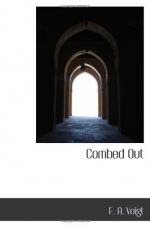But why not desert? Why not escape to the south of France? Why not enjoy a week, a fortnight, a month of freedom? I would be caught in the end—I would be punished. I would receive Number 1 Field Punishment, and I would be tied to a wheel or post, but nevertheless it would be worth it! I imagined myself slipping out of camp at night and walking until dawn. Then I would sleep in some wood or copse and then walk on again, calling at remote farms to buy bread and eggs and milk. I would reach the little village, the main street winding between white houses and flooded with brilliant moonlight. I would climb the wall and drop into the familiar garden and await the morning. Then I would knock at the door and I would be welcomed by an old peasant woman, and she would ask: “Tu viens en perme?” How could I answer that question? It worried me, I felt it was spoiling my dream. But I dreamt on and at the same time battled against increasing depression. Even a few days of freedom would be a break, a change from routine. And would the little village be the same as when I saw it last? No, it would be different, it would be at war. I might escape from the army, but I could never escape from the war. My dream had vanished.
But I would make the best of things. I would enjoy the immediate present—was I not losing hours of sheer pleasure by harbouring these thoughts and ignoring the beauty of the day?
Some distance ahead was a farm of the usual Flemish type—a thatched roof, whitewashed walls, and green shutters. Near by was a little pond with willows growing round it. In the field beyond, a cow was grazing peacefully. The sky seemed a deeper blue through the willow-branches. The tender green of the grass was wonderfully refreshing to the eyes. The cow had a beautiful coat of glossy brown that shone in the sunlight. I abandoned myself to the charm of the little idyll that was spread out before me and forgot the war once again.
And then all at once a gigantic, plume-shaped, sepia coloured mass rose towering out of the ground. There was a rending, deafening, double thunder-clap that seemed to split my head. For a moment I was dazed and my ears sang. Then I looked up—the black mass was thinning and collapsing. The cow had disappeared.
I walked into the yard full of rage and bitterness. All the men had left the sheds and were flocking into the road. Some were strolling along in leisurely fashion, some were walking with hurried steps, some were running, some were laughing and talking, some looked startled, some looked anxious, and some were very pale.
We crossed the road and the railway. Then, traversing several fields, we came to a halt and waited. We waited for nearly an hour, but nothing happened and we gradually straggled back to the yard.
Some of us walked to the spot where the shell had burst. There was a huge hole, edged by a ring of heaped-up earth, and loose mould and grassy sods lay scattered all round. Here and there lay big lumps of bleeding flesh. The cow had been blown to bits. The larger pieces had already been collected by the farmer, who had covered them with a tarpaulin sheet from which a hoof protruded.




